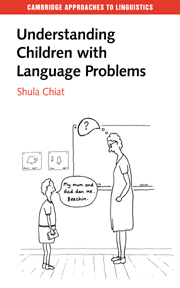Book contents
- Frontmatter
- Contents
- Acknowledgements
- Glossary of text conventions and symbols
- Introduction
- Part I Problems with words
- Part II Grappling with verb structure
- Part III Missing function morphemes
- 11 Filling out sentences
- 12 ‘That one not working, see’: problems with auxiliary verb processing
- Part IV Hidden meanings, baffling meanings
- Endpoint and springboard
- Further reading
- References
- Index
12 - ‘That one not working, see’: problems with auxiliary verb processing
Published online by Cambridge University Press: 05 September 2012
- Frontmatter
- Contents
- Acknowledgements
- Glossary of text conventions and symbols
- Introduction
- Part I Problems with words
- Part II Grappling with verb structure
- Part III Missing function morphemes
- 11 Filling out sentences
- 12 ‘That one not working, see’: problems with auxiliary verb processing
- Part IV Hidden meanings, baffling meanings
- Endpoint and springboard
- Further reading
- References
- Index
Summary
Ruth is a spirited 10-year-old who loves horse riding and wants to work in a stable when she grows up. She has lively exchanges with her class mates and teacher, chats enthusiastically about school and home activities, jokes, fantasises, gets embarrassed, has fun putting down friends or family, throws side-long glances at adults when she knows they are discussing her, is both keen and shy to take the stage. She is observant and sensitive and initiates conversation in just the ways you would expect of a girl approaching adolescence:
(Ruth has just come into the room)
R: I know, your hair cut.
SC: I'm going to have one? Or I have had one?
R: You have one.
SC: Yeah. I did have one. It's too short, isn't it? But it will grow.
R: Like me.
Ruth's open and interested demeanour only clouds over and closes up when her difficulties with language come into focus. At this point, she is likely to fire angry and conversation-closing words:
SC: Yeah, your hair's getting long. Who cuts your hair?
R: Tressers (rather distorted).
SC: Tracy's?
R: Nothing!! [_n] your business.
SC: (catching on, but too late) Oh, hairdressers! Like me.
Once her difficulties are touched on, and especially if they become apparent in public, she is likely either to withdraw or to lash out with expressions of rejection. These negative feelings also surface in role-play games which are in her control. She often acts out aggressive fantasies through the roles she creates:
(Ruth has SC working for her, and after ordering her about, finds ways of ensuring that her employee cannot get away)
- Type
- Chapter
- Information
- Understanding Children with Language Problems , pp. 206 - 224Publisher: Cambridge University PressPrint publication year: 2000

